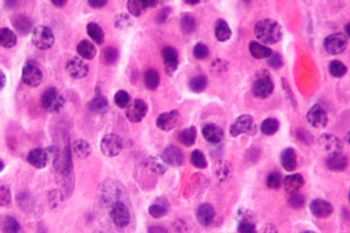
The resubmission of the biologics license application for cosibelimab for locally advanced or metastatic cutaneous squamous cell carcinoma follows a complete response letter from the FDA in December 2023.

The resubmission of the biologics license application for cosibelimab for locally advanced or metastatic cutaneous squamous cell carcinoma follows a complete response letter from the FDA in December 2023.

Disease-free survival and overall survival improved with celecoxib plus advanced chemotherapy in patients with PIK3CA-mutated stage III colon cancer.

The clinical practice guideline from the American Society for Radiation Oncology focuses on the use of definitive and postoperative radiation therapy in patients with HPV-associated oropharyngeal squamous cell carcinoma.

With several options available for the second-line treatment of HR-positive, HER2-negative mBC, an expert emphasized the importance of tailoring treatment for every patient.

The updated risk evaluation and mitigation strategies for autologous CAR T-cell therapy removed requirements for training and educational materials about the risk for certain toxicities.

Daniel Verina, DNP, ACNP-BC, discussed how CAR T-cell therapy is changing the treatment landscape for patients with multiple myeloma.

Durvalumab plus chemotherapy in the perioperative setting met event-free survival and overall survival endpoints in MIBC.

An oncology nurse's experience with her mother's cancer and her own BRCA2 diagnosis shapes her approach to patient care.

Improving progression-free survival and confirming results with MRD testing were treatment qualities that patients with CLL reported were more important than other factors.

Hypofractionated radiotherapy was noninferior to conventional radiotherapy in patients with low-risk prostate cancer.

A durvalumab-based combination followed by an olaparib-based maintenance therapy improved progression-free survival in newly diagnosed advanced ovarian cancer without BRCA1/2 mutations.

PSMA response was linked to improved metastasis-free survival in patients with oligometastatic castration-sensitive prostate cancer.

Adding ibrutinib to chemoimmunotherapy induction with autologous stem-cell transplantation improves failure-free survival rates in younger patients with mantle cell lymphoma.

Assisted reproductive techniques may be safe for patients with BRCA-mutated breast cancer, according to an ESMO study.

Patients with previously untreated chronic lymphocytic leukemia treated with venetoclax plus obinutuzumab either with or without ibrutinib experienced significant PFS improvements.

Compared with combination chemotherapy, ribociclib plus endocrine therapy provided a significant progression-free survival benefit in HR-positive, HER2-negative advanced breast cancer.

The winner of the 2024 Extraordinary Healer® award, Meaghan Mooney, BSN, RN, OCN, found a rewarding career caring for patients and their families, even after transitioning to a leadership role. Now, she uses her expertise to help children facing a parent's cancer diagnosis.

Progression-free survival and platinum chemoresistance may be predicted by tumor-stroma proportion in patients with high-grade serous ovarian cancer.

Srigowri Kota, MSN, BA, APRN, AGNP-C, AOCNP, provides an in-depth look at enfortumab vedotin for the treatment of patients with urothelial cancer in a downloadable reference sheet.

Frontline durvalumab plus chemotherapy, followed by maintenance durvalumab with or without olaparib improved responses in stage III/IV or recurrent endometrial cancer.

What should a patient do when there is an incidental finding on radiographic films? Is the patient responsible for following up, or is it the responsibility of the provider who ordered the imaging? What if they had the imaging done at an urgent care center or in the emergency department and they do not have a primary care provider?

Throughout June, the FDA approved drugs for the treatment of diseases including myelodysplastic syndrome, thyroid cancer, endometrial cancer, colorectal cancer, and follicular lymphoma.

Monotherapy with IBI343 received fast track designation from the FDA for advanced unresectable or metastatic pancreatic ductal adenocarcinoma.

An sBLA was granted priority review from the FDA, which is seeking the approval of pembrolizumab plus chemotherapy for the frontline treatment of malignant pleural mesothelioma.

Treatment with linvoseltamab provided durable efficacy for patients with relapsed/refractory multiple myeloma.

The ready-to-dilute formulation of Tepylute for breast and ovarian cancers can help to reduce prep time and provide more accurate dosing.

Most cancer centers reported a shortage of at least 1 systemic therapy in a survey published by the NCCN.

Compared with epoetin alfa, treatment with luspatercept improved erythroid response rates and the duration of transfusion independence for lower-risk myelodysplastic syndromes.

An accelerated approval has been granted by the FDA to epcoritamab-bysp (Epkinly) for adult patients with relapsed or refractory follicular lymphoma after 2 or more lines of systemic therapy.

Oncology rapid-access clinics should be essential to patient care standards across the oncology continuum.